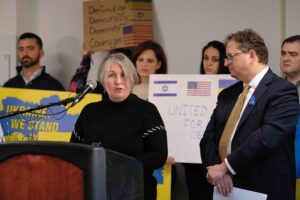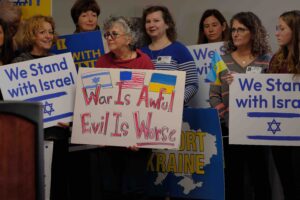Members of the Twin Cities Jewish and Ukrainian communities held a press conference on Thursday morning to jointly condemn Russia and Hamas as agents of terror, and call for more U.S. aid to Ukraine and Israel.
The press conference was organized by the Jewish Community Relations Council of Minnesota and the Dakotas, and the MN Ukrainian American Advocacy Committee, and held at the Minneapolis campus of the Minnesota JCC.
“The fact that we’re standing here together pretty much says it all,” said Steve Hunegs, the executive director of the JCRC.
The last time the JCRC and the MN UAAC held a joint event was in the wake of Russia’s invasion of Ukraine, where Russian troops leveled cities and committed mass execution and rape of civilians. To this gathering, the Russian atrocities echo what Hamas did to Israeli civilians on Oct. 7 in a brutal attack on southern Israel that killed 1,400 people.
Even the over 200 hostages taken by Hamas have a counterpart in Ukraine: Russia’s abduction of thousands of Ukrainian children, given new identities and forcibly adopted by Russian families.
“We’re all here to unite together – the Jewish community, the Ukrainian community, the Ukrainian Jewish community – in defense of our beloved homelands, and in defense of democracy,” Hunegs said.
Luda Anastazievsky, MN UAAC chair, noted that both Ukrainians and Jews have been traumatized by genocides: The Holodomor, in the 1930s, and the Holocaust in the 1940s. Now she spoke of a new axis of evil threatening each nation.
“The transnational terrorist networks that include Hamas, Russian, and the Iranian regime are responsible for a new trauma and have to be held accountable,” Anastazievsky said.
“We call on the U.S. government to help its allies – Israel and Ukraine – who are engaged in existential and multidimensional wars on the physical, psychological, and informational levels,” she said.

Luda Anastazievsky speaking alongside Steve Hunegs
Iranian-made drones are being used by Russia in Ukraine, and Iran is the state-sponsor of Hamas and other terrorist groups, like Hezbollah in Lebanon. Ukrainian intelligence alleges that Russia armed Hamas with weapons it took from Ukraine, and shortly before Hamas’ Oct. 7 attack, it received millions of dollars routed through a crypto exchange based in Moscow.
Hamas leaders are usually warmly welcomed in Russia, including at a meeting last week in Moscow. This week, Russia told the United Nations that Israel has no right to self-defense against Hamas’ attack.
For speakers at the press conference, linking Russia and Hamas is not just about pointing out a joint threat. As Ukraine fights against Russia, global attention and support has been slipping amid other issues – which works in Russia’s favor.
“Ukraine and Israel are connected because Hamas and Russia are connected,” said Olga Frayman, a Ukrainian Jew involved in both communities.
Frayman noted that Oct. 7 was Russian dictator Vladimir Putin’s birthday. Hamas’ attack was “a lovely present to the Russian dictator guaranteed to divert attention, funds, and military aid from Ukraine…through the extremists on both the right and left of American politics,” she said.
That diversion is already taking place in Congress, as the Republican-controlled House of Representatives fights over aid to Israel and Ukraine. A bill with aid for Israel passed by Republicans is being decried as a “poison pill,” with the aid money coming from cuts to the Internal Revenue Service that stand no chance of being approved by a Democrat-controlled Senate or President Joe Biden.
Meanwhile, many Republicans are opposed to aid for Ukraine, jeopardizing any efforts in the House – though there may be another “poison pill” aid bill with aid tied to funding for U.S. border security.
At the same time, left-wing protests against Israel’s response to Hamas – including airstrikes targeting Hamas leaders that have killed thousands of Palestinian civilians in Gaza – advocate for cutting or conditioning U.S. aid to Israel.
Increased aid to both Israel and Ukraine are top priorities for Biden’s administration.
“Ukraine and Israel are fighting the same existential war,” Frayman said. “We need to continue providing more military aid to Ukraine. Ukraine, just like Israel, must emerge victorious in its fight against an enemy that wants to see it wiped off the map.”

Some of the signs at the press conference
Speakers also condemned the various justifications that erupted in the wake of the Hamas attack, with some blaming Israel for its occupation of the West Bank and blockade of Gaza and seeing Hamas’ actions as entitled resistance.
“We have all seen the babies burnt, the women raped, the elderly hostages, the decapitated corpses,” said DFL State Sen. Ron Latz. “I don’t understand the silence in some quarters, or the compulsion to say that it is somehow understandable or justifiable by the history of the region – as if any history justifies intentional barbarism against innocent civilians.”
Latz also took aim at pro-Palestinian protesters in Minnesota and chants like “From the river to the sea, Palestine will be free,” reiterating the mainstream Jewish view that they call for Israel’s annihilation.
Many of those same protestors are calling for a ceasefire, and consider Israel’s response to Hamas disproportionate given the number of civilian deaths. But after Hamas’ attack, many Israelis and Jews want a decisive end to the terrorist organization, leaving no room to doubt Israel’s right to operate in Gaza.
“Israel seeks to prevent the killing and destruction of its people, and that means removing the barbarians who perpetrated the inhumane acts and then celebrated them,” Latz said.
“Do not fall into the trap of analyzing proportionality…Proportionally, the 1,400 dead in Israel are the equivalent of 45,000 Americans. Can you imagine the U.S. response if 45,000 New Yorkers, rather than 2,996, had been killed on 9/11?”
Latz touched on a key American Jewish concern amid the Israel-Hamas war: Safety.
He condemned both rising antisemitism and Islamophobia, and noted that “reports of anti-Jewish hate acts have spiked over 400% over this month [compared to the same period last year],” Latz said. “That’s scary and personal to me as a Jew. I have never felt more unsafe in my life in the U.S. than I do today.”
That sentiment was echoed by Frayman – compounded by the memory of antisemitism in the Soviet Union. Many Soviet Jews immigrated to the U.S. to escape persecution, never thinking that they would face it again in this country.
“We came here because this country offered us a beacon of hope of a life in a democratic country where the rights of its minorities are respected,” Frayman said.
Of particular concern is the situation on college campuses, known for being a flashpoint around the Israeli-Palestinian conflict. Jewish students have reported being harassed, with one Israeli student attacked on a campus in NYC and students at Cornell University facing online threats to murder and rape them and shoot up the on-campus kosher dining hall.
“Never in my life did I think I would need to be teaching my college student [daughter] how to stay safe on campus as a Jewish woman,” Frayman said.

